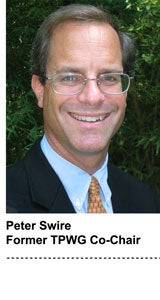 After announcing that he had been appointed to an intelligence review panel, Peter Swire, co-chair of the Tracking Protection Working Group (TPWG), which is tasked with creating a universal standard for the “Do Not Track” browser feature, has resigned from the TPWG.
After announcing that he had been appointed to an intelligence review panel, Peter Swire, co-chair of the Tracking Protection Working Group (TPWG), which is tasked with creating a universal standard for the “Do Not Track” browser feature, has resigned from the TPWG.
A seasoned negotiator, Swire was brought in last November to salvage the DNT process, which seemed not to be making headway on its goal to create a browser spec for the tracking opt-out feature – and had occasionally devolved into ad hominem attacks between privacy advocates and ad industry stakeholders. While Swire has successfully elevated the tone, progress was often hard to see.
In an email delivered to the group last night, Swire writes, “Today the White House announced that I will be serving on President Obama’s Review Group on Intelligence and Communications Technology… I feel a sense of responsibility in being asked to serve on the Review Group, and to do so as effectively as possible. I therefore have informed Jeff Jaffe of W3C that I will not be able to continue as co-chair of the Working Group.”
Swire’s exit follows the resignation of Jonathan Mayer, a privacy advocate who made clear his frustrations with the group’s inability to arrive at a decision. In his resignation letter, Mayer noted, “Given the lack of a viable path to consensus, I can no longer justify the substantial time, travel and effort associated with continuing in the Working Group.”
A professor at the Georgia Institute of Technology and a former White House privacy official during the Clinton administration, Swire served as TPWG co-chair for approximately nine months.
Along with his fellow co-chair, Matthias Schunter, Swire was charged with bringing the diverse interests of the 110-member group to a consensus on what it means when a Web user turns on a Do Not Track signal.
In a February blog post titled “Full Steam On Do Not Track,” Swire outlined his road map for the organization. The group, Swire explained, will focus on “the point-by-point resolution of issues that will lead us to actual spec language. We will define each task, have members of the group take ownership for drafting text and resolutely march through the issues each week from here out.”
The goal was to produce a proposal that would be available for public comment by the summer. Swire’s plans quickly fell apart, however. In June, Swire and Schunter rejected the Digital Advertising Alliance’s draft proposal for a Do Not Track standard and, by July, Swire admitted, “There is not a way to get to last call by the end of July,” during a conference call with group members.
It is not yet clear who will replace Swire as co-chair of the TPWG.











